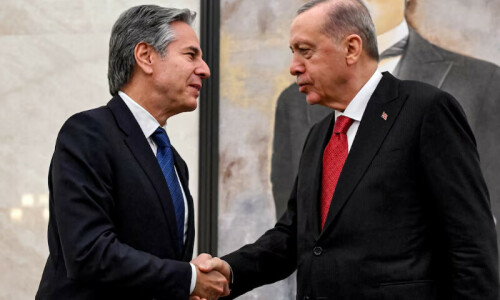WASHINGTON, Jan 14: US air raids have been a political liability for President Asif Ali Zardari, who has called on the US to stop them, says a human rights group.
The group called Human Rights Watch also reported on Wednesday that military operations in Fata had been accompanied at times by “massive civilian displacement, extrajudicial executions, house demolitions, and arbitrary detentions”.
At the urging of the United States, the Pakistani armed forces have engaged in increasingly aggressive counterterrorism operations in areas along the Afghan border, the group observes.
According to the HRW annual report, since September US drones are believed to have carried out more than a dozen missile attacks on alleged militant targets in the tribal areas, killing dozens of people amid persistent claims of civilian casualties.
Despite selective military operations and periodic peace deals, the government has not succeeded in preventing the Taliban and members of other militant groups from committing serious human rights offences.
Battles between pro-Taliban militants and government security forces in Swat displaced non-combatants and led to severe insecurity.
Political situation
The report claims that the new government has accepted demands from the army for transfer of power on the basis of “legal continuity, whereby the new government would not challenge the legal basis of Pervez Musharraf’s rule nor attempt to hold him or the army legally accountable for the former president’s coups and abuses during his time in power”.
The report observes that President Zardari has inherited all the powers former president Musharraf had accrued, which includes measures enacted under emergency rule and through controversial constitutional amendments.
The report acknowledges that since the civilian government came to power, protection of civil and political rights has improved. Media restrictions have been revoked, opposition rallies and demonstrations have been allowed to proceed without government hindrance or violence, and military personnel have been withdrawn from civilian administrative and political positions.
The government has emphasised dialogue to resolve the political dispute between the federal government and Balochistan province and to extend meaningful political rights to the troubled tribal areas bordering Afghanistan.
The report notes that “while the new government has been keen to promote civil liberties and human rights, its rhetoric has not always been matched by action”.
Judicial independence
The report points out that despite repeated public assertions to the contrary, President Zardari “reneged” on commitments and his signed agreement with opposition leader Nawaz Sharif to restore to office deposed Supreme Court Chief Justice Iftikhar Mohammad Chaudhry, who had been arbitrarily fired and detained by Mr Musharraf during emergency rule.
Balochistan
In a separate chapter on the situation in Balochistan, the report notes that the new Pakistani government apologised in 2008 to the people of Balochistan for excesses and abuses made under Mr Musharraf, released high-profile political prisoners in the province, and affirmed its intention to reach a rights-respecting political compact between the Pakistani federation and the province.
“These overtures calmed the situation in Balochistan considerably and attacks by both Baloch militants and the Pakistani military stopped.”
Disappearances
The report notes that terrorism suspects are frequently detained without charges or, if charged, are often convicted without proper judicial process. Human Rights Watch has documented scores of illegal detentions, instances of torture, and “disappearances” in Pakistan’s major cities. Counterterrorism laws also continue to be misused.
Until the imposition of the state of emergency in November 2007, the Supreme Court was investigating 400 cases of enforced disappearance. In response to pressure from the Supreme Court, scores were freed or produced in court and charged. “The Supreme Court under Musharraf-appointed Chief Justice Abdul Hameed Dogar has notably failed to pursue such cases.” Pakistan has yet to sign the international treaty banning enforced disappearances.
Women
Despite condemnation from human rights groups, Israrullah Zehri, a senator who publicly defended honour killings, and legislator Hazar Khan Bijarani, accused of presiding over a jirga that ordered the handing over of five girls, aged six and younger, as “compensation” in a dispute, were elevated to Pakistan’s cabinet.













































Dear visitor, the comments section is undergoing an overhaul and will return soon.